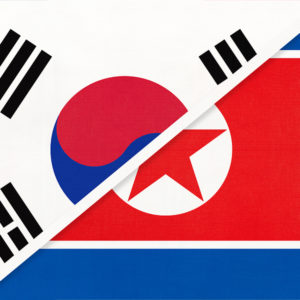Both Koreas, North and South, confront Joe Biden with what may be the most perplexing foreign policy problem of his presidency.
North Korean leader Kim Jong Un never began to give up his nuclear program after his summit with Donald Trump in Singapore in June 2018. Their brief joint statement promised their commitment to a “nuclear-free Korean peninsula,” but Kim made clear at this month’s congress of his ruling Workers’ Party that nuclear power remains the essential feature of his foreign policy.
Trump has gone on claiming to have averted a second Korean War, but he cut short his second summit with Kim in Hanoi in February 2019 when Kim held fast against any firm promise on denuclearization. Then, amid renewed hopes, Trump got nowhere with Kim during a meeting at Panmunjom on the line between the two Koreas four months later.
Choices range between “strategic patience,” the policy pursued when Biden was vice president under President Barack Obama, or renewed negotiations in search of compromise.
One factor that Biden must consider is the desire of South Korea’s left-leaning president, Moon Jae-in, for dialog. Moon should be among the first foreign leaders to call on Biden. He will impress on Biden his desire for attempting to renew talks.
Moon, who has met Kim at three summits beginning with their first rendezvous at Panmunjom in April 2018, has been stymied in attempts to see him ever since the end of the Trump-Kim dialog. North Korea accuses him of placing top priority on South Korea’s historic alliance with the U.S.
A number of scenarios are possible. Moon might suggest four-party talks, including China and both Koreas. U.S. negotiators, however, will be mindful of the fruitless outcome of four-party talks in the late 1990s. Optimism about new multilateral talks would be absurd.
Another much-discussed possibility is an end-of-war agreement as advocated by Moon. North Korea, however, wants to replace the Korean War armistice signed at Panmunjom in July 1953 with a peace treaty calling for withdrawal of U.S. military power from the Korean peninsula. North Korea’s goal is takeover of the South.
Given the realities, the only option may be preliminary talks to get a first-hand understanding of the threatening tone of Kim Jong Un’s remarks at the party congress after his initial confession of economic failure. Might desperation compel Kim to soften his position, perhaps to suspend or curtail his nuclear program?
Fantasies of a breakthrough will evaporate if Kim orders more missile tests. He talked at the party congress of a new supersonic submarine and showed off a submarine-launched ballistic missile at the parade after the congress. Kim ordered North Korea’s last nuclear test in September 2017 and the last long-range missile test two months later. Trump may claim the summitry of 2018 and 2019 got Kim to suspend all testing, but North Korean scientists and engineers have been busy all long developing more nukes and missiles.
In the interests of a smooth relationship with Biden, Moon will endorse the U.S.-Korean alliance. Questions, however, surround OPCON, giving South Korean operational control of forces in the event of war. It’s not clear whether South Korean and U.S. forces are capable of coordinating smoothly under OPCON in a real-time emergency. They need to test their capabilities in intricate joint exercises that infuriate the North Koreans.
At the same time, the U.S. and South Korea have to resolve contentious negotiations on the South’s contribution to the cost of keeping U.S. bases and 28,500 U.S. troops in the country. Trump badly upset the alliance by demanding South Korea pay $5 billion a year, more than five times the $927 million paid last year. Biden’s team will be looking for agreement on slightly more than $1 billion.
Trump as president left many difficult issues for Biden to settle. After all his big talk, his showmanship, his dream of a Nobel peace prize, North Korea remains a de facto nuclear power holding nukes and missiles like a club over South Korea, Japan and the U.S. If there is reason for hope, it’s that North Korea is too weak for Kim to be able to carry out any of the threats with which he is greeting Joe Biden, whom he never congratulated for defeating his friend Donald Trump in November’s presidential election.

